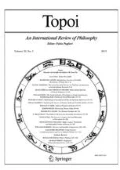Abstract
Probabilism in epistemology does not have to be of the Bayesian variety. The probabilist represents a person's opinion as a probability function; the Bayesian adds that rational change of opinion must take the form of conditionalizing on new evidence. I will argue that this is the correct procedure under certain special conditions. Those special conditions are important, and instantiated for example in scientific experimentation, but hardly universal. My argument will be related to the much maligned Reflection Principle (van Fraassen, 1984, 1995), and partly inspired by the work of Brian Skyrms (1987).
Similar content being viewed by others
Bibliography
Skyrms, B.: 1987, 'Dynamic Coherence and Probability Kinematics', Philosophy of Science 54, 1–20.
van Fraassen, B.: 1984, 'Belief and the Will', Journal of Philosophy 81, 235–256.
van Fraassen, B.: 1989, Laws and Symmetry, Oxford: Oxford University Press.
van Fraassen, B.: 1995, 'Belief and the Problem of Ulysses and the Sirens', Philosophical Studies 77, 7–37.
Author information
Authors and Affiliations
Rights and permissions
About this article
Cite this article
van Fraassen, B.C. Conditionalization, A New Argument For. Topoi 18, 93–96 (1999). https://doi.org/10.1023/A:1006286003463
Issue Date:
DOI: https://doi.org/10.1023/A:1006286003463



